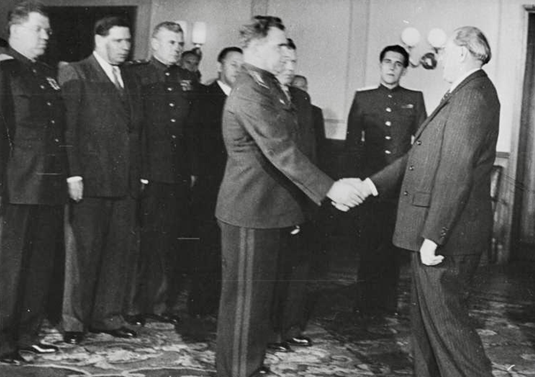Two Marshals and a Wall in Berlin
- Maria A. Kithcart

- Dec 4, 2023
- 4 min read
Updated: Aug 28, 2025

Pictured: First Deputy Chairman of the KGB S.K. Tsvigun (center), Marshal of the Soviet Union V.I. Chuikov (far right), Marshal of the Soviet Union I.S. Konev (left), first secretary of the Komsomol Central Committee E.M. Tyazhelnikov (second from right) at the session of the Supreme Soviet of the USSR. Moscow, 1970s. The author of the photo is S. Gurariy, a photojournalist for the Trud newspaper. From the Tsvigun family archive.
During my studies of Marshal Chuikov’s life and work, I have taken the opportunity to learn more about his leadership in post-war Germany. Reading about his effort to end the Berlin Blockade (read his order here) was fascinating to me, as was his guidance in the birth of the German Democratic Republic (GDR). What I did not realize, however, was his level of involvement in the building of the Berlin Wall years after his time of service in Germany ended.
The Berlin Wall emerged as an emblematic representation of the Cold War, embodying the global division into two clearly defined ideological blocs. Construction began on 13 August 1961, and the wall stood for nearly 28 years until its fall on 9 November 1989. To address the issue of skilled workers moving from East Germany to West Germany, Walter Ulbricht wanted to build a physical barrier. The official reason given was to protect the socialist state from the influence of Western capitalism and to prevent espionage and sabotage.
This is where Marshal Chuikov enters the story… Colonel Anatoly Merezhko (later Colonel-General), who served in Chuikov’s 62nd Army’s headquarters in Stalingrad, continued to be promoted during his career and was assigned to the German Democratic Republic in 1957. By 1960, Merezhko was appointed the deputy head of the operational department of the GSVG headquarters. In his book, The Path to the Berlin Wall, Manfred Wilke included Merezhko’s anecdote about a special trip the Soviet Union’s Commander-in-Chief of the Soviet Ground Forces, Marshal Chuikov, made from Moscow to Berlin accompanied by Marshal Konev:

“On 10 August [1961], we received the news in the GSFG that two Marshals were about to fly in. […] We only knew that the men were Marshal of the Soviet Union Chuikov and Marshal of the Soviet Union Konev. A meeting was called of the Military Council of the Group, and we joined them. Participants were the members of the Military Council: Yakubovsky, Vassyagin, Ariko, and Yakubovsky's first deputy, General Belik. As guests, the three members of the GDR were also present: Hoffmann, Mielke, and Maron. I sat with the folio of documents (the plan and the explanatory documents) on the edge of the meeting at the small table. Chuikov comes and sees me right away: ‘I ordered only the Military Council to meet, why is this Colonel Merezhko here?’ Yakubovsky explained that the colonel had drawn up the plan and was ready to provide information on all of the materials. Chuikov looked at me: ‘Alright, he is my Stalingrader. Then stay.’
He sits down at the place of chairman, Konev and Yakubovsky sit next to him, and Chuikov explains that the Presidium of the Central Committee of our party, Comrade Khrushchev, has granted him the authority to say that Ivan Stepanovich Konev […] will be appointed to Commander-in-Chief of the GSEG, and Chuikov then lists all of his functions and assets.
All members of the Military Council had long faces, nobody expected anything like this. Chuikov goes on to explain: ‘Ivan Ignatyevich, you will remain first deputy of Comrade Konev; Konev will deal with military political questions, and you will still be responsible for the combat readiness of the Group, for the military preparations and the supply [of the troops] with everything necessary. Ivan Stepanovich will release you from the [military political] duties. Whatever you did before, you will continue to do that.’
Then he turns to the ministers of the GDR and asks them to report on the state of readiness to carry out the plans. Each of them, with the exception of Hoffmann, stated that he was ready; Hoffmann said that he would be ready to carry out the plan within six hours of receiving the order—others had asked for one week. Chuikov says: ‘Two days. And no postponement. The X hour at which the plan will be implemented will be conveyed to you by Ivan Stepanovich Konev.’
After that he instructed me to take him to another room where the high-frequency radio communication was situated. He ordered: ‘Connect me with Khrushchev.’ And then he reported: ‘Nikita Sergeyevich, Ivan Stepanovich has assumed the office of Commander-in-Chief, and the German ministers have received the order to stand ready.’ […]
With this, the meeting ended. Chuikov flew back. At 12 AM on 13 August, Konev set the plan in motion and the operation began. From 10 to 12 August, the Combat Groups of the Working Class were called from the large cities of the GDR, from Leipzig, Dresden, Halle, etc., and gathered in Berlin” (253-254).



